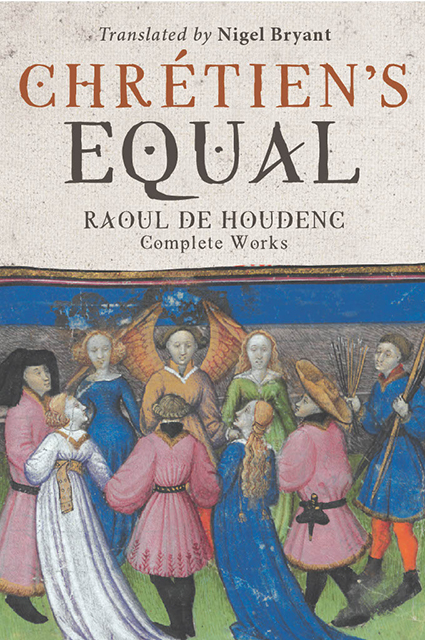Book contents
- Frontmatter
- Contents
- Introduction
- The Romance of the Wings (Le Roman des Eles)
- Meraugis of Portlesguez (Meraugis de Portlesguez)
- Sir Gawain and the Avenging of Raguidel (La Vengeance Raguidel)
- The Burgess’s Burgeoning Blight (Le Borjois Borjon or Li Dis Raoul Hosdaing)
- The Dream of Hell (Le Songe d’Enfer)
- The Path to Paradise (La Voie de Paradis)
- Index to Meraugis of Portlesguez
- Index to The Avenging of Raguidel
- Arthurian Studies
The Romance of the Wings (Le Roman des Eles)
Published online by Cambridge University Press: 14 January 2023
- Frontmatter
- Contents
- Introduction
- The Romance of the Wings (Le Roman des Eles)
- Meraugis of Portlesguez (Meraugis de Portlesguez)
- Sir Gawain and the Avenging of Raguidel (La Vengeance Raguidel)
- The Burgess’s Burgeoning Blight (Le Borjois Borjon or Li Dis Raoul Hosdaing)
- The Dream of Hell (Le Songe d’Enfer)
- The Path to Paradise (La Voie de Paradis)
- Index to Meraugis of Portlesguez
- Index to The Avenging of Raguidel
- Arthurian Studies
Summary
I’ve kept my thoughts to myself till now, but I’ve come to realise that keeping quiet too long won’t get you very far, any more than talking too much. So I’ve decided to share with you in this romance some fresh thoughts about knights, thoughts on which they may model themselves and learn something of courtesy. I just wish I were a better poet than I am.
One thing about knights is certain: chivalry is the fount of courtesy, and that fount is inexhaustible, no matter how much is drawn from it. It derives from God and knights possess it – wherever it springs forth in the world, it comes from them. How’s that? I mean they embody it root and branch, while other people merely have the bark. Anyone hoping for a measure of courtesy, however small, will have to wait for it to come from knights and from their order, for it appears exclusively in their domain.
Their order implies such nobility and dignity, truly, that it’s only right that they should all be aware of what’s involved. Why am I saying that? Why am I so edgy? Have I seen something that bothers me? Yes, I have. What most threatens to harm and undermine the order is this: that many knights are unaware and ignorant – and this is really bad – of why knights are made and what they’re meant to do! What their name essentially implies is nobility: so superior to all others is their name that, if they truly understood how illustrious it is, they wouldn’t dare do many of the things they do. What would stop them? Shame. But they don’t realise what their name involves: some knights don’t understand what’s required of them and just go around declaring ‘I’m a knight!’
If such knights, then, have no respect for their name, and – tragically – don’t recognise the nature of their order and their order doesn’t recognise their failings, who is there who truly knows them for what they are? I’ll tell you: heralds, story-tellers, fiddlers. Raoul de Houdenc deems them proven touchstones for assessing chivalry. I’ll explain: when merchants get together to assay gold, they put the touchstone to it and then know if it’s an alloy, of marketable quality, or pure.
- Type
- Chapter
- Information
- Chrétien's Equal: Raoul de HoudencComplete Works, pp. 37 - 46Publisher: Boydell & BrewerPrint publication year: 2021

